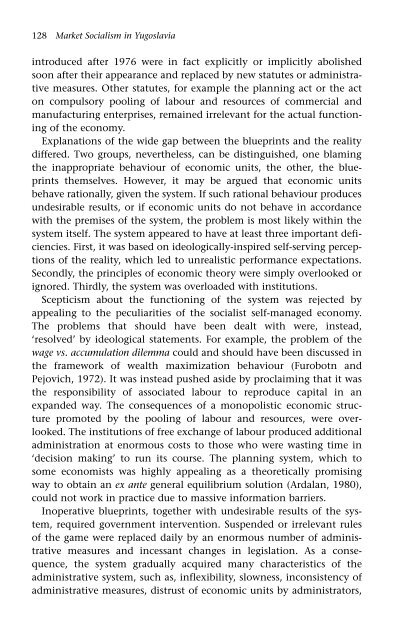Equality, Participation, Transition: Essays in Honour of Branko Horvat
Equality, Participation, Transition: Essays in Honour of Branko Horvat
Equality, Participation, Transition: Essays in Honour of Branko Horvat
Create successful ePaper yourself
Turn your PDF publications into a flip-book with our unique Google optimized e-Paper software.
128 Market Socialism <strong>in</strong> Yugoslavia<br />
<strong>in</strong>troduced after 1976 were <strong>in</strong> fact explicitly or implicitly abolished<br />
soon after their appearance and replaced by new statutes or adm<strong>in</strong>istrative<br />
measures. Other statutes, for example the plann<strong>in</strong>g act or the act<br />
on compulsory pool<strong>in</strong>g <strong>of</strong> labour and resources <strong>of</strong> commercial and<br />
manufactur<strong>in</strong>g enterprises, rema<strong>in</strong>ed irrelevant for the actual function<strong>in</strong>g<br />
<strong>of</strong> the economy.<br />
Explanations <strong>of</strong> the wide gap between the bluepr<strong>in</strong>ts and the reality<br />
differed. Two groups, nevertheless, can be dist<strong>in</strong>guished, one blam<strong>in</strong>g<br />
the <strong>in</strong>appropriate behaviour <strong>of</strong> economic units, the other, the bluepr<strong>in</strong>ts<br />
themselves. However, it may be argued that economic units<br />
behave rationally, given the system. If such rational behaviour produces<br />
undesirable results, or if economic units do not behave <strong>in</strong> accordance<br />
with the premises <strong>of</strong> the system, the problem is most likely with<strong>in</strong> the<br />
system itself. The system appeared to have at least three important deficiencies.<br />
First, it was based on ideologically-<strong>in</strong>spired self-serv<strong>in</strong>g perceptions<br />
<strong>of</strong> the reality, which led to unrealistic performance expectations.<br />
Secondly, the pr<strong>in</strong>ciples <strong>of</strong> economic theory were simply overlooked or<br />
ignored. Thirdly, the system was overloaded with <strong>in</strong>stitutions.<br />
Scepticism about the function<strong>in</strong>g <strong>of</strong> the system was rejected by<br />
appeal<strong>in</strong>g to the peculiarities <strong>of</strong> the socialist self-managed economy.<br />
The problems that should have been dealt with were, <strong>in</strong>stead,<br />
‘resolved’ by ideological statements. For example, the problem <strong>of</strong> the<br />
wage vs. accumulation dilemma could and should have been discussed <strong>in</strong><br />
the framework <strong>of</strong> wealth maximization behaviour (Furobotn and<br />
Pejovich, 1972). It was <strong>in</strong>stead pushed aside by proclaim<strong>in</strong>g that it was<br />
the responsibility <strong>of</strong> associated labour to reproduce capital <strong>in</strong> an<br />
expanded way. The consequences <strong>of</strong> a monopolistic economic structure<br />
promoted by the pool<strong>in</strong>g <strong>of</strong> labour and resources, were overlooked.<br />
The <strong>in</strong>stitutions <strong>of</strong> free exchange <strong>of</strong> labour produced additional<br />
adm<strong>in</strong>istration at enormous costs to those who were wast<strong>in</strong>g time <strong>in</strong><br />
‘decision mak<strong>in</strong>g’ to run its course. The plann<strong>in</strong>g system, which to<br />
some economists was highly appeal<strong>in</strong>g as a theoretically promis<strong>in</strong>g<br />
way to obta<strong>in</strong> an ex ante general equilibrium solution (Ardalan, 1980),<br />
could not work <strong>in</strong> practice due to massive <strong>in</strong>formation barriers.<br />
Inoperative bluepr<strong>in</strong>ts, together with undesirable results <strong>of</strong> the system,<br />
required government <strong>in</strong>tervention. Suspended or irrelevant rules<br />
<strong>of</strong> the game were replaced daily by an enormous number <strong>of</strong> adm<strong>in</strong>istrative<br />
measures and <strong>in</strong>cessant changes <strong>in</strong> legislation. As a consequence,<br />
the system gradually acquired many characteristics <strong>of</strong> the<br />
adm<strong>in</strong>istrative system, such as, <strong>in</strong>flexibility, slowness, <strong>in</strong>consistency <strong>of</strong><br />
adm<strong>in</strong>istrative measures, distrust <strong>of</strong> economic units by adm<strong>in</strong>istrators,

















